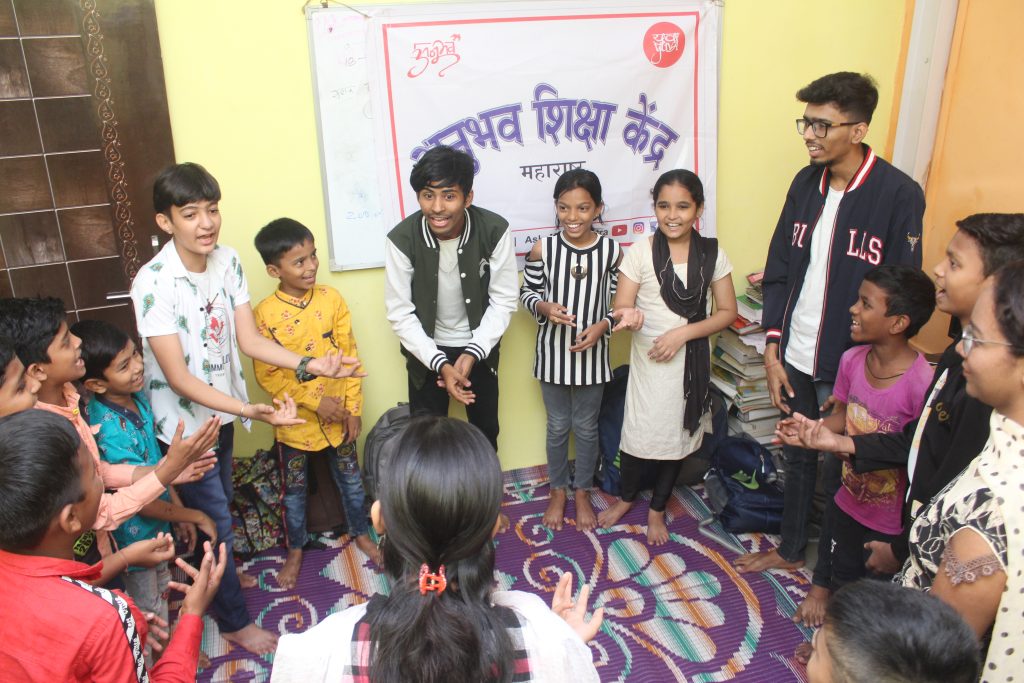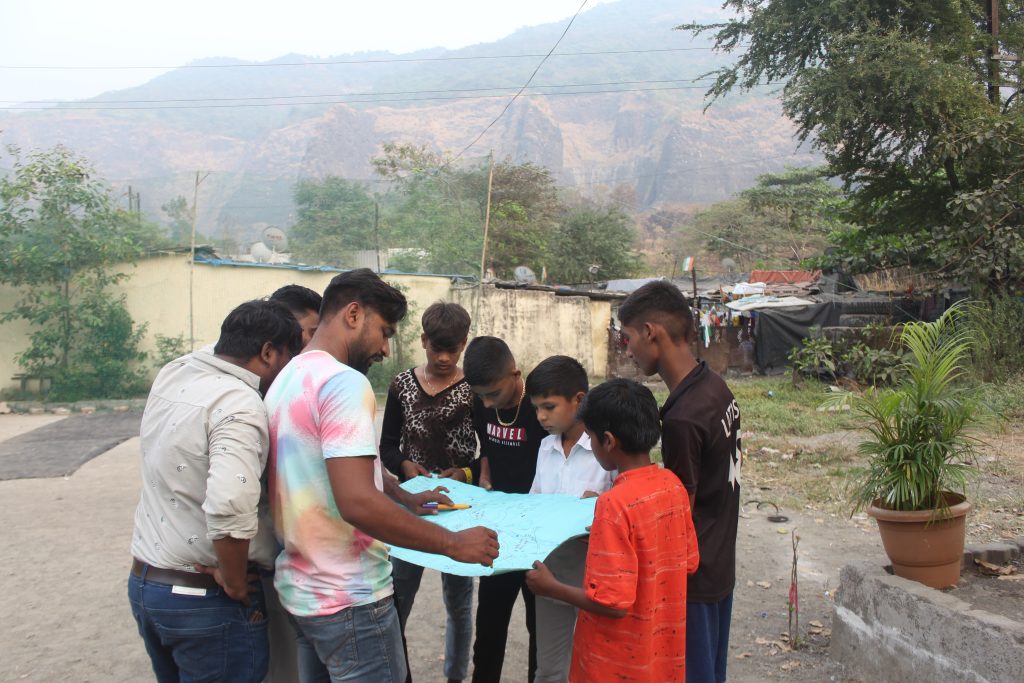This is the second of a two-part blog that introduces the Anubhav Shiksha Kendra (ASK) of YUVA which has been engaging with the youth in Maharashtra for the last 3-decades. The first part can be read here.
Anubhav Shiksha Kendra (ASK) [hyperlink to introductory blog post] is a youth-led experiential learning programme facilitated by YUVA which aims to provide a safe, nurturing environment for young people to develop skills, confidence, and character. Youth in India today face multiple challenges and prejudices across social, systemic, economic, and socio-political levels, and the ASK programme aims at providing appropriate support and skills to the youth to overcome these challenges.

The programme’s grassroots, three-tier, progressive participation structure (mitra, sahayogi, and sathi membership statuses) operates across local, district, and regional levels; it contributes to shaping young peoples’ worldview by inducing curiosity and awareness about their social and political contexts, and empowers them with the knowledge, skills, and confidence to contribute towards social change in their respective communities. While the programme’s thematic scope is broad, there is a strong focus on livelihood, governance, and gender, as three core aspects of active life that are particularly relevant to youth today. These topics are broached from numerous angles, from social awareness to motivation, and youth exchanges to capacity building.
I. Livelihood
Developing and securing adequate, sustainable livelihoods is crucial and often a top priority for young people. The ASK programme adopts a holistic approach to addressing livelihoods, not simply skilling young adults with requirements for specific jobs, but encouraging the exploration of alternative, innovative, sustainable livelihoods to empower them to be economically resilient.
The ASK members (with the support of the ASK team) assist each other in practical ways and believe in the importance of decent and dignified work. Youth are assisted in accessing job placements according to their areas of interest and are notified of job fairs and opportunities, and biodatas of young people in need of employment are shared among companies. Youth are encouraged to take initiative in their learning and employment, leading to greater satisfaction and ownership of achievements as well as better ensuring long-term sustainability of their work and adaptability.
II. Governance
YUVA believes that youth have a central role to play in advocacy and participatory governance. Developing leadership skills and voicing their demands is key in amplifying public pressure for equity-oriented policies and programmes. Youth involvement is key to improving government accountability in both rural and urban areas. It also encourages youth to become politically and socially attentive and active, and to invest in the development and improvement of their local communities.

The youth of Maharashtra and Madhya Pradesh have continually demonstrated their passion and competency in the social and political sphere. One of the preparatory bases for encouraging youth to get involved in governance is the ‘Youth Leadership Building Course’ (YLBC) which enables young leaders to build their confidence and leadership skills to confront societal challenges. They are empowered with knowledge and awareness, and assisted in building campaigns and collectives for positive change.
Youth also take an active role in local development. In several areas, youth participate in the Development Plan for their localities, incorporating their knowledge on the role and function of local government bodies and methods of advocacy. Many young people conduct community-based monitoring and social auditing so as to be aware of the goings-on in their localities and to promote transparency and accountability in their respective governance systems. It allows them to be actively involved in values-based political awareness and understanding. When young people are personally involved and invested in improving the social and political environments around them, momentum is built and governance systems are held accountable to the people they serve.
In addition to involving youth in their own localities and communities, ASK also facilitates youth exchanges among groups from both rural and urban areas so they learn from each other about the differences, similarities, and accessibility of their respective governance systems. This interaction also contributes to developing greater understanding and relationships between peers.
Another notable achievement of ASK has been the work surrounding the draft National Youth Policy (2021), in which consultations were organised to spread awareness and consolidate youths’ perspectives, objections, and suggestions for the improvement of the draft – in alignment with the United Nations’ Sustainable Development Goals. The draft was also translated into regional languages to improve accessibility among youth from different areas and to allow a diverse group of young people to put forward their recommendations.
III. Gender
The prevalence of adverse gender norms, negative stereotypes, and discrimination permeates the lives of youth in India. Perceptions and restrictions imposed on young people determined by their gender identity have profound effects on every aspect of their life – from social belonging to career prospects, from personal safety to sense of freedom. ASK’s emphasis on gender strives to cultivate respect among young people for all gender identities, diversify perspectives, and improve understanding of feminism as an ideology of equality and equity.
Members of ASK are encouraged to challenge the status quo and break free from societal restrictions. This is particularly difficult for girls, especially when their parents hold traditional views regarding gender-roles. However, ASK has observed the power of peer support and the multiplier effect it has, as an increasing number of girls join ASK and begin to assert their rights after observing other girls engage with the programme.
With these goals in mind, ASK has conducted numerous projects and activities to promote equality and equity across genders. For example, awareness sessions allow young people to broaden their perspectives and grow in understanding of the concepts of ‘sex’ and ‘gender’. Youth are taught about the oppressive impacts of the patriarchal norms on women. They discuss the double burden of responsibility on women as they shoulder work both inside and outside the home, and they learn about the value of work, whether paid or unpaid, whether undertaken by men or women. Issues affecting those identifying as transgender are also discussed to promote a loving, understanding, accepting community.
Topics are also presented in an engaging manner where participants prepare speeches or participate in debates to encourage critical thinking and grow in confidence in asserting gender justice. ASK members also perform street plays to raise awareness about gender equality in their local communities. Safe spaces are facilitated to allow youth to discuss ideas, hear alternative perspectives, and learn from the experiences of their peers.
Youth Participation for Social Transformation
As ASK membership continues to grow and across various districts, the potential for lasting social change also increases. India’s youth are dynamic and talented; encouraging their curiosity and passion for improving their local communities allows society to experience the positive transformation that it needs to best meet the needs of its people.
Young people create for themselves a sense of control and power over the trajectory of their own lives and are empowered to become economically resilient, innovative, and adaptable. They are equipped with the knowledge, support, and skills to actively engage in local governance to demand the change and accountability that their communities need. They invest their time and energy into learning about gender justice, engage in relevant discussions to promote equality and acceptance, and embrace their role in dismantling adverse impacts of the patriarchy. Youth across Maharashtra and Madhya Pradesh are already inducing positive community transformation; with the support of YUVA and ASK, they are further empowered to continue inciting such change.


